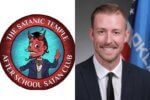Dobie Weasel is the first Native American to lead a multiethnic Assemblies of God congregation
Dobie Weasel is the first Native American to lead a multiethnic Assemblies of God congregation
Dobie Weasel wanted to communicate a message–a symbolic one that would have a more lasting impact than the sermon he was about to preach at his first service as senior pastor of Glad Tidings Church in Omaha, Neb. So, for his installation service in June 1999, he asked his mother to bring one of the most time-honored symbols of commitment he knew–a pair of quilts.
Weasel, an Assiniboin American Indian, unfurled the two hand-stitched quilts on the Glad Tidings platform that day. These two were handmade by his cousin and decorated with a brilliant starburst needlework on each. Such quilts have long been used in his Native culture to demonstrate the virtue of commitment to those who receive them.
He presented one quilt to George Kallapa, a Native evangelist and one of Weasel’s mentors. He gave the other to Robert Nazarenus, Nebraska district superintendent for the Assemblies of God (AG) denomination.
Certain that God had called him to two ministries, Weasel was publicly demonstrating his commitment to both. It was his way of communicating his message–that he was no longer just an evangelist to Native Americans or just the first Native pastor to lead a large non-Native church in the Assemblies of God. The presentation was a symbol that both groups would be his passion.
Weasel’s work keeps him at the intersection of a number of cultures. Having broken ground as a Native AG pastor, he leads a multiethnic congregation of about 1,200. He travels several times a year to work with Native peoples. He ministers in a city where race relations were strained last summer when an unarmed black suspect was shot by police.
At 39, Weasel considers himself a newcomer in leading
multiracial congregations. Yet he has learned that success with people in a racially mixed setting comes from a commitment, he says, to “major on the major and minor on the minor.”
“When you look out at Glad Tidings, you see brown, yellow, black, white, red. And it’s beautiful. We don’t stress our cultural differences. We stress our unity in Christ,” Weasel told Charisma.
Les Beauchamp, senior pastor of Trinity Interdenominational Church in Omaha says Weasel brings an unusual bridge-building ability to relations between the city’s blacks and whites.
“He’s experienced racial inequality as a Native American. I believe God has used him as a bridge of racial reconciliation and dialogue and understanding because he’s not white and not black,” Beauchamp said.
Before joining Glad Tidings last year, Weasel questioned whether or not he was ready to jump back into mixed-race ministries. After growing up in a reservation life of alcohol and drug abuse and dysfunctional families, he became a Christian at age 18 and headed to Bible college. He began his pastoral career in Gallup, N.M., at a white, Navajo and Hispanic church. Afterward, in the 1990s, he traveled as an evangelist primarily to Natives.
When his three children became teen-agers, Weasel sought a ministry that required less travel. He considered several pastoral positions. Meanwhile, Glad Tidings had been without a pastor for nine months, and attendance had dropped from more than 1,000 to about 850.
The church board contacted David Moore, the AG’s intercultural ministries director, looking for pastors who were members of an ethnic minority and could lead a multiracial church. Weasel was on Moore’s short list.
“I’d seen him grow in leadership capabilities,” Moore said. “He’s a little flamboyant, but under that is substance. He’s a man of integrity.”
By the time Glad Tidings called him, Weasel was convinced God wanted him to remain an evangelist. The church’s board members did some fast talking just to keep Weasel on the phone long enough to hear them out. Because Nebraska has a small Native population, Weasel questioned why God would move him there when his ministry among Native people was effective where it was.
More than 18
months later, he’s still exploring the connection between being the pastor of Glad Tidings and ministering in his Native culture. But he says he belongs at the Omaha church, which felt like home to Weasel and his wife, Jamie, on their first visit.
Managing both ministries requires all of Weasel’s considerable energy. He works nearly nonstop during Glad Tidings’ back-to-back Sunday services, from 8:30 a.m. to about 1 p.m. He takes the microphone to lead singing, waving his suit coat and urging the congregation to dance in worship and continue the spirit of revival he’s seen sweep the group in recent weeks.
His sermons take him into the aisles, to the back of the choir loft or on top of a pew to make a point. The congregation peppers his sermon with “Amen!” and “C’mon!”
After 4-1/2 hours of this, he drops into a chair in the church office with a bottle of orange juice. So how can he mix three major ministries among Natives with his Glad Tidings pastoral responsibilities each year?
“He is on fire for people as individuals, for the Natives as a people,” Beauchamp said. “He carries Natives in his heart all the time.”
Natives are naturally spiritual people, Weasel says, but they need the instruction of the gospel. He preaches for Natives at annual youth conferences in Saskatchewan and Phoenix and at a North Dakota camp that trains young missionaries headed for Native communities.
He’s learning to turn down ministry offers outside of his calling that come as often as six times a month. Weasel said he seeks God’s help in focusing his energy in the right places.
Judging by the vigorous worship services he leads at Glad Tidings, it will take a lot of places to use up all that energy.







Leave a Comment
You must be logged in to post a comment.